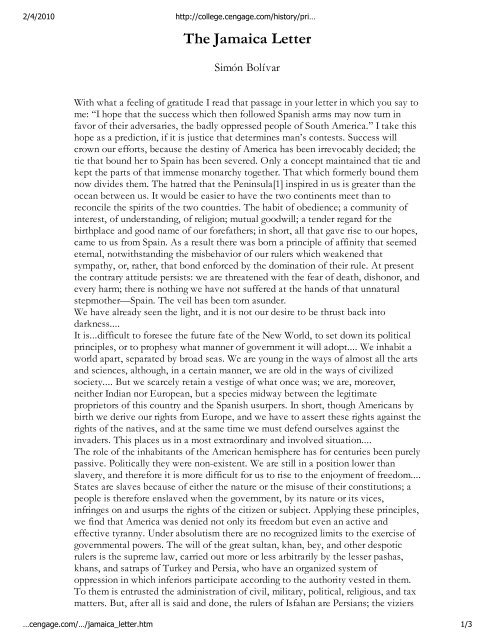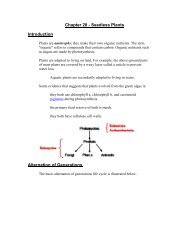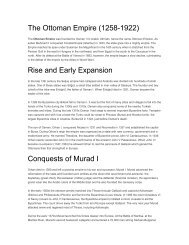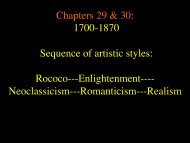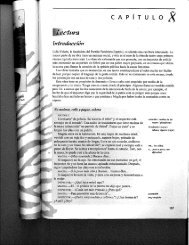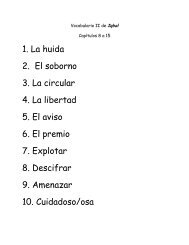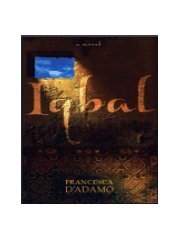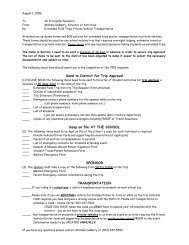The Jamaica Letter - Bvsd
The Jamaica Letter - Bvsd
The Jamaica Letter - Bvsd
You also want an ePaper? Increase the reach of your titles
YUMPU automatically turns print PDFs into web optimized ePapers that Google loves.
2/4/2010 http://college.cengage.com/history/pri…<br />
<strong>The</strong> <strong>Jamaica</strong> <strong>Letter</strong><br />
Simón Bolívar<br />
With what a feeling of gratitude I read that passage in your letter in which you say to<br />
me: “I hope that the success which then followed Spanish arms may now turn in<br />
favor of their adversaries, the badly oppressed people of South America.” I take this<br />
hope as a prediction, if it is justice that determines man’s contests. Success will<br />
crown our efforts, because the destiny of America has been irrevocably decided; the<br />
tie that bound her to Spain has been severed. Only a concept maintained that tie and<br />
kept the parts of that immense monarchy together. That which formerly bound them<br />
now divides them. <strong>The</strong> hatred that the Peninsula[1] inspired in us is greater than the<br />
ocean between us. It would be easier to have the two continents meet than to<br />
reconcile the spirits of the two countries. <strong>The</strong> habit of obedience; a community of<br />
interest, of understanding, of religion; mutual goodwill; a tender regard for the<br />
birthplace and good name of our forefathers; in short, all that gave rise to our hopes,<br />
came to us from Spain. As a result there was born a principle of affinity that seemed<br />
eternal, notwithstanding the misbehavior of our rulers which weakened that<br />
sympathy, or, rather, that bond enforced by the domination of their rule. At present<br />
the contrary attitude persists: we are threatened with the fear of death, dishonor, and<br />
every harm; there is nothing we have not suffered at the hands of that unnatural<br />
stepmother—Spain. <strong>The</strong> veil has been torn asunder.<br />
We have already seen the light, and it is not our desire to be thrust back into<br />
darkness....<br />
It is...difficult to foresee the future fate of the New World, to set down its political<br />
principles, or to prophesy what manner of government it will adopt.... We inhabit a<br />
world apart, separated by broad seas. We are young in the ways of almost all the arts<br />
and sciences, although, in a certain manner, we are old in the ways of civilized<br />
society.... But we scarcely retain a vestige of what once was; we are, moreover,<br />
neither Indian nor European, but a species midway between the legitimate<br />
proprietors of this country and the Spanish usurpers. In short, though Americans by<br />
birth we derive our rights from Europe, and we have to assert these rights against the<br />
rights of the natives, and at the same time we must defend ourselves against the<br />
invaders. This places us in a most extraordinary and involved situation....<br />
<strong>The</strong> role of the inhabitants of the American hemisphere has for centuries been purely<br />
passive. Politically they were non-existent. We are still in a position lower than<br />
slavery, and therefore it is more difficult for us to rise to the enjoyment of freedom....<br />
States are slaves because of either the nature or the misuse of their constitutions; a<br />
people is therefore enslaved when the government, by its nature or its vices,<br />
infringes on and usurps the rights of the citizen or subject. Applying these principles,<br />
we find that America was denied not only its freedom but even an active and<br />
effective tyranny. Under absolutism there are no recognized limits to the exercise of<br />
governmental powers. <strong>The</strong> will of the great sultan, khan, bey, and other despotic<br />
rulers is the supreme law, carried out more or less arbitrarily by the lesser pashas,<br />
khans, and satraps of Turkey and Persia, who have an organized system of<br />
oppression in which inferiors participate according to the authority vested in them.<br />
To them is entrusted the administration of civil, military, political, religious, and tax<br />
matters. But, after all is said and done, the rulers of Isfahan are Persians; the viziers<br />
…cengage.com/…/jamaica_letter.htm 1/3
matters. But, after all is said and done, the rulers of Isfahan are Persians; the viziers<br />
of the Grand Turk are Turks; and the sultans of Tartary are Tartars....<br />
How different is our situation! We have been harassed by a conduct which has not<br />
only deprived us of our rights but has kept us in a sort of permanent infancy with<br />
regard to public affairs. If we could at least have managed our domestic affairs and<br />
our internal administration, we could have acquainted ourselves with the processes<br />
and mechanics of public affairs....<br />
Americans today, and perhaps to a greater extent than ever before, who live within<br />
the Spanish system occupy a position in society no better than that of serfs destined<br />
for labor, or at best they have no more status than that of mere consumers. Yet even<br />
this status is surrounded with galling restrictions, such as being forbidden to grow<br />
European crops, or to store products which are royal monopolies, or to establish<br />
factories of a type the Peninsula itself does not possess. To this add the exclusive<br />
trading privileges, even in articles of prime necessity, and the barriers between<br />
American provinces, designed to prevent all exchange of trade, traffic, and<br />
understanding. In short, do you wish to know what our future held?—simply the<br />
cultivation of the fields of indigo, grain, coffee, sugar cane, cacao, and cotton; cattle<br />
raising on the broad plains; hunting wild game in the jungles; digging in the earth to<br />
mine its gold—but even these limitations could never satisfy the greed of Spain.<br />
So negative was our existence that I can find nothing comparable in any other<br />
civilized society, examine as I may the entire history of time and the politics of all<br />
nations. Is it not an outrage and a violation of human rights to expect a land so<br />
splendidly endowed, so vast, rich, and populous, to remain merely passive?<br />
As I have just explained, we were cut off and, as it were, removed from the world in<br />
relation to the science of government and administration of the state. We were never<br />
viceroys or governors, save in the rarest of instances; seldom archbishops and<br />
bishops; diplomats never; as military men, only subordinates; as nobles, without<br />
royal privileges. In brief, we were neither magistrates nor financiers and seldom<br />
merchants—all in flagrant contradiction to our institutions....<br />
It is harder, Montesquieu[2] has written, to release a nation from servitude than to<br />
enslave a free nation. This truth is proven by the annals of all times, which reveal<br />
that most free nations have been put under the yoke, but very few enslaved nations<br />
have recovered their liberty. Despite the convictions of history, South Americans<br />
have made efforts to obtain liberal, even perfect, institutions, doubtless out of that<br />
instinct to aspire to the greatest possible happiness, which, common to all men, is<br />
bound to follow in civil societies founded on the principles of justice, liberty, and<br />
equality. But are we capable of maintaining in proper balance the difficult charge of<br />
a republic? Is it conceivable that a newly emancipated people can soar to the heights<br />
of liberty, and, unlike Icarus, neither have its wings melt nor fall into an abyss? Such<br />
a marvel is inconceivable and without precedent. <strong>The</strong>re is no reasonable probability<br />
to bolster our hopes.<br />
More than anyone, I desire to see America fashioned into the greatest nation in the<br />
world, greatest not so much by virtue of her area and wealth as by her freedom and<br />
glory. Although I seek perfection for the government of my country, I cannot<br />
persuade myself that the New World can, at the moment, be organized as a great<br />
republic. Since it is impossible, I dare not desire it; yet much less do I desire to have<br />
all America a monarchy because this plan is not only impracticable but also<br />
impossible. Wrongs now existing could not be righted, and our emancipation would<br />
be fruitless. <strong>The</strong> American states need the care of paternal governments to heal the<br />
sores and wounds of despotism and war....<br />
From the foregoing, we can draw these conclusions: <strong>The</strong> American provinces are<br />
fighting for their freedom, and they will ultimately succeed. Some provinces as a<br />
2/4/2010 http://college.cengage.com/history/pri…<br />
…cengage.com/…/jamaica_letter.htm 2/3
2/4/2010 http://college.cengage.com/history/pri…<br />
matter of course will form federal and some central republics; the larger areas will<br />
inevitably establish monarchies, some of which will fare so badly that they will<br />
disintegrate in either present or future revolutions. To consolidate a great monarchy<br />
will be no easy task, but it will be utterly impossible to consolidate a great<br />
republic....<br />
When success is not assured, when the state is weak, and when results are distantly<br />
seen, all men hesitate; opinion is divided, passions rage, and the enemy fans these<br />
passions in order to win an easy victory because of them. As soon as we are strong<br />
and under the guidance of a liberal nation which will lend us her protection, we will<br />
achieve accord in cultivating the virtues and talents that lead to glory. <strong>The</strong>n will we<br />
march majestically toward that great prosperity for which South America is<br />
destined....<br />
[1] Refers to the Iberian Peninsula, consisting of Spain and Portugal.<br />
[2] Montesquieu (1689–1755) was a French philosopher, historian, and jurist best known for his Spirit of<br />
the Laws (1755) and his theory that the powers of government—executive, legislative, and judicial—must<br />
be separated to ensure individual freedom.<br />
Credits: From Simón Bolívar, Selected Writings, ed., Harold A. Bierck, Jr., trans. by Lewis Bertrand, 1951,<br />
pp. 103-122.<br />
…cengage.com/…/jamaica_letter.htm 3/3


